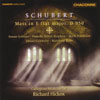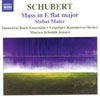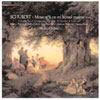Schubert Mass No 6
A Schubert bonanza but Hickox really shows how to play this heavenly music
View record and artist detailsRecord and Artist Details
Composer or Director: Franz Schubert
Genre:
Vocal
Label: Chaconne
Magazine Review Date: 5/2008
Media Format: CD or Download
Media Runtime: 0
Mastering:
Stereo
Catalogue Number: CHAN0750

Tracks:
| Composition | Artist Credit |
|---|---|
| Mass No. 6 |
Franz Schubert, Composer
Collegium Musicum 90 Franz Schubert, Composer James Gilchrist, Tenor Mark Padmore, Tenor Matthew Rose, Baritone Pamela Helen Stephen, Mezzo soprano Richard Hickox, Conductor Susan Gritton, Soprano |
Composer or Director: Franz Schubert
Genre:
Vocal
Label: Naxos
Magazine Review Date: 5/2008
Media Format: CD or Download
Media Runtime: 52
Mastering:
Stereo
DDD
Catalogue Number: 8570381

Tracks:
| Composition | Artist Credit |
|---|---|
| Mass No. 6 |
Franz Schubert, Composer
Franz Schubert, Composer Immortal Bach Ensemble Leipzig Chamber Orchestra Morten Schuldt-Jensen, Conductor |
| Stabat Mater |
Franz Schubert, Composer
Franz Schubert, Composer Immortal Bach Ensemble Leipzig Chamber Orchestra Morten Schuldt-Jensen, Conductor |
Label: Mirare
Magazine Review Date: 5/2008
Media Format: CD or Download
Media Runtime: 0
Mastering:
Stereo
Catalogue Number: MIR051

Author: Richard Wigmore
Elsewhere though, Corboz’s direction is rather less compelling. In the Kyrie he ignores Schubert’s quasi allegretto direction and gives the music a burdened tramp that tends to get slower and more burdened as it proceeds. Hickox, at a slightly more mobile tempo, combines gravitas with a Schubertian lyrical ease, while Morten Schuldt-Jensen’s attractive Naxos version is the swiftest and lightest, with a suggestion of a celestial waltz. At the start of the Gloria Corboz stresses Schubert’s moderato e maestoso qualification but fails to lift the rhythms. The result is plodding and earthbound, with none of the exhilaration caught by the other two conductors. Nor was I convinced by the gear changes in the “Domine Deus” and, especially, the Agnus Dei, where Corboz slows to adagissimo for the hushed pleas of “Miserere” and then lunges forward again. Both Hickox and Schuldt-Jensen manage their tempo fluctuations far more naturally.
Corboz’s solo singers are decent, no more, in the Benedictus (the alto can be intrusively tremulous), while in the “Et incarnatus est”, set as a round, the two tenors outgun the rather fragile soprano. The soloists are also a drawback in the otherwise fresh, up-tempo – and, where needed, amply dramatic – performance from Schuldt-Jensen. Here the cello melody of the “Et incarnatus est” has a lovely, subtle lilt, only for the magic to be dissipated by the raw-toned tenors.
Turn to Hickox and you’ll hear how this heavenly music should sound, with the three soloists (Mark Padmore, James Gilchrist – an ideally matched tenor pairing – and soprano Susan Gritton) singing with pure tone and wondering tenderness. Hickox scores, too, with his extra choral firepower at climaxes, and the wonderfully pungent sonorities of Collegium Musicum 90, whether in the dry, fearful rattle of period timpani in the Credo, the lovely “woody” oboe and clarinet in the “Et incarnatus est” or the steely, scything trumpets in the Agnus Dei. With the bonus of the teenage Schubert’s stark setting of part of the Stabat mater, the Naxos recording can be recommended to bargain-hunters. But the Chandos disc is worth the extra outlay, a version of this still under-appreciated masterpiece to rival the rather darker, more disturbing 1997 performance from Nikolaus Harnoncourt (Elatus, 5/97R).
Discover the world's largest classical music catalogue with Presto Music.

Gramophone Digital Club
- Digital Edition
- Digital Archive
- Reviews Database
- Full website access
From £8.75 / month
Subscribe
Gramophone Full Club
- Print Edition
- Digital Edition
- Digital Archive
- Reviews Database
- Full website access
From £11.00 / month
Subscribe
If you are a library, university or other organisation that would be interested in an institutional subscription to Gramophone please click here for further information.




